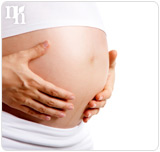
Pregnancy hormones are the hormones created in your body to support your embryo during pregnancy, or increased levels of reproductive hormones already found in your body, whose functions adapt for pregnancy. They carry the brunt of the blame for the rapid and massive changes that women go through during pregnancy. In fact, pregnancy hormones are known to affect pregnant women not only physically but emotionally.
As your belly bulges and your hormones rage, take comfort in knowing that some of the same nuisances that make you uncomfortable during pregnancy also benefit the health of your baby. Read on to find out what exactly the hormones progesterone, human chorionic gonadotropin (hCG), and estrogen do for you and your unborn baby.
Progesterone
Although you produce significant amounts of progesterone up until menopause, levels of this hormone skyrocket during pregnancy, and for a good reason.
Progesterone helps prepare your reproductive system for sustaining a baby inside you. Normally, output of this hormone comes from the ovaries and adrenal glands, but during pregnancy your developing placenta also produces progesterone.
Before your ovary releases an egg, the follicle will release progesterone to signal to the uterus that it is time to prepare for a baby, on the off chance that the egg becomes fertilized. At this time, the lining of your uterus will become thicker.
Progesterone also stops the muscles of the uterus from contracting, preventing premature birth. This hormone also acts in the same way on smooth muscle found elsewhere in the body and can sometimes be the culprit of acid reflux.
HCG

HCG is the pregnancy hormone produced in the placenta, which helps protect the fetus. It is this hormone which is sought out by pregnancy tests that will give either a positive or negative result. HCG works with the reproductive system to oversee production of other hormones. For example, immediately after conception it tells the ovaries to continue producing progesterone until the placenta can begin producing it itself, about 10 weeks into the pregnancy. HCG is often the reason women suffer from morning sickness and fatigue in the first trimester of pregnancy.
Estrogen
Although it takes a back seat during pregnancy compared with during other life processes, estrogen is still an important pregnancy hormone. Along with progesterone, it is created in the placenta during pregnancy. It directs more blood flow to your developing baby, and it also oversees the increased production of prolactin, which prepares your breasts for milk production after your baby is born. Estrogen is also responsible for severe mood swings during pregnancy.
More Information about Natural Hormones
Pregnancy is just one of the complex processes coordinated by your hormones. Other examples include menstruation and menopause. Click on the following link to read more about natural hormones.


